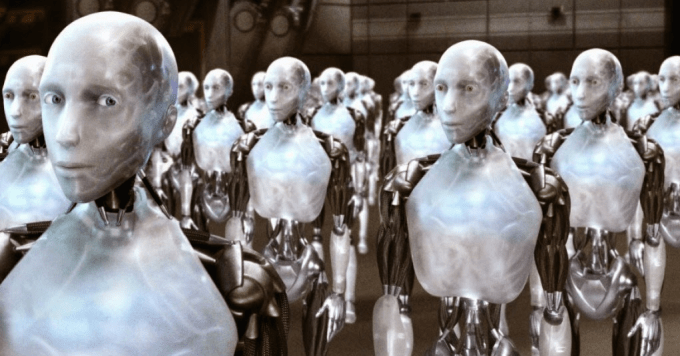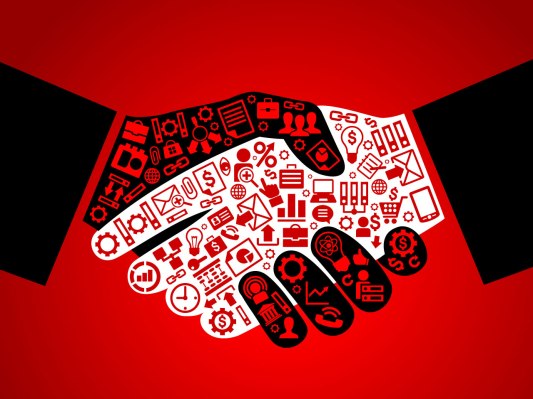There is a common misunderstanding about the coming automated economy that may destroy us all.
Most people in business and finance (and most people, frankly) think that the new economy (of artificial intelligence and autonomous machines) is like the old economy: satisfying customers’ needs for products and services.
That’s just not so.
The real heart of the new economy will be about helping people need each other more.
No, I’m not talking about the market for dating services. To build a new economy (and a decent, functional society), innovation must help us need each other more and in better ways… to bind us to each other. If innovations disintegrate those bonds, and decrease our mutual need we will head downhill.
When we no longer need each other, it’s all over.
In the end, we are all here for each other. Many people in the business world don’t understand that. Not that they disagree: they just don’t get it. Permit me to explain, because we can all win if we get this right.
Those leaders captaining the economy believe, legitimately, that they create the economy by selling customers needed products and services, generating the revenues that create the markets and GDPs that enable societies to endure.
An economy is indeed about satisfying customers but that’s not exactly the same as selling them products and services. Many business leaders will say this is academic nonsense, that it’s the same thing. But by not seeing the distinction they cannot see whether they are helping or hurting the market and their customers. Plus, in that distinction lies the biggest business opportunity in history.
The distinction is explained by the difference between macro- and micro-economics. Macro-economics knows that people must earn in order to spend. The worker and the customer are the same.
An economy is indeed about satisfying customers but that’s not exactly the same as selling them products and services.
In micro-economics the customer and the worker are different: one earns, the other spends.
Corporations live in the micro world, they innovate and automate, lay off the worker to deliver a better deal to the customer. The customer is king, not the worker.
But customers who have lost their jobs are weak kings; their biggest need is to get a good job with a reliable income. When business tries to satisfy their need to earn by helping them live ever more cheaply, the economy is plunged into a paradox: economic growth always means increased revenues.
And this competition for increasing revenues can ultimately shrink the economy — creating a growth-profit paradox. Companies lay off workers to serve customers who lost their jobs in other companies who laid them off to sell cheaper. The paradox is fueled by the “race against the machine.”
There is a solution to the paradox, but it is not what some micro-minded techno-anarchists are suggesting: to let innovation automate all jobs and offer people universal basic income.

In this vision of the future, people won’t need to work for money and can instead spend their time doing meaningful things.
“Freedom actually begins only where labor which is determined by necessity and mundane considerations ceases,” said Karl Marx a century ago. His vision was a society where technological innovation provides people with everything they need, where nobody is anyone else’s servant and everyone is equal.
But Marx’s Communism failed and will continue to fail.
The core concept of community is that people depend on each other. A society happens when a cluster of people are bound by a network of personal commitments. It is a self-organizing, self-reinforcing network of commitments between individuals that shapes a common language for trust, ethics, law and practice in which each committed individual has a stake.
This common language is the basis for any economy, culture or society. Therefore, “everyone is a customer, nobody a worker” is a recipe for disaster, it will dissolve societies because the interpersonal commitments and thus the personal stakes evaporate. Joblessness and exclusion also threaten societies, for the same reason. But where“everyone is a customer and a worker,” on the other hand, good societies evolve and prosper.
A society happens when a cluster of people are bound by a network of personal commitments.
Utopians who point out that Finland is introducing basic universal income have not understood. Finland needs fewer pensioners and more workers or their economy will crash within a few years. No politician will raise the pension age and force elderly voters back to be job-seekers.
Shifting from pensions to universal basic income can be a solution, one might say that instead of raising the pension age to seventy, they lower it to seventeen. We discussed these things at the i4j Helsinki Summit. The Finns are aiming to reinvent the Nordic model; it is the opposite of ‘utopian’ communism.
The solution to the growth-profit paradox is to move from today’s task-centered economy, focused on lowering the cost of tasks, to the people-centered economy that increases the value of people, which I have written about before.
The most powerful way to create new value for the customer is creating new value with the customer, with the help of innovation. The customer is the worker is the capital.
The Kauffman Foundation’s NEG New Entrepreneurial Growth Agenda includes a piece where I show how a people-centered business can always beat a competition of task-centered businesses, as long as innovation is good enough.

In the people-centered economy the micro-economy is fully aligned with the macroeconomy. Now the customer is a worker for countries and enterprises alike. For both, the customer-worker is the capital they invest in. GDP and revenues both grow when the ‘customer-worker’ increases in value.
The people-centered economy solves the growth-revenue paradox. It knocks down the wall between labor policy and innovation policy, enabling governments to co-invest in innovation-for-jobs ecosystems that disrupt unemployment, giving people good jobs instead of welfare.
The step from the task-centered to the people-centered economy may seem large. But while it is a fundamental shift, it is really a small step, easily taken, by simply adding an Innovation-for-Jobs ecosystem to today’s economy. This ecosystem integrates entrepreneurs, investors, policymakers and others engaged in raising the value of people. Read more about it in my contribution to the Kauffman Foundation New Entrepreneurial Growth Agenda.
With support from Kauffman, Google, Cisco and others, i4j, the Forum I co-chair with Vint Cerf, is moving to make the Innovation-for-Jobs Ecosystem happen. We are assembling the players and we have published our vision in a book, “Disrupting Unemployment” together with special chapters by an impressive list of i4j thought leaders.
In my previous column, I pointed to how Sebastian Thrun’s Udacity has switched to a people-centered business model. The Gates Foundation, the Lumina Foundation and others are priming a market for connecting investors to education for work.

Education startups are creating business around income-share agreements, where students can go to college without paying tuition. Instead, they pay a part of their income for a few years after they graduate and get a job. Thus the income-sharing startup invests in the students. The ROI is the difference between the tuition fee they pay and the income-share they earn.
Vemo Education is presently building such a project together with Purdue University. This gives them an incentive to get the student a well-payed job after college.
Imagine a standalone company, no college involved; their best clients may be talented kids from poor families who, helped by the startup, can choose their college and be coached to a great job. If this concept takes hold, as I think it can, colleges will end up negotiating fees with these new companies, instead of with the student—something like health insurance and care providers, today.
Pave, recently funded at roughly $300 million, offers a lending platform for millennials wanting to achieve a goal in life. Let’s say a kid wants to be a scriptwriter. Someone who believes in her talent may cover her costs and be a mentor.
This model offers the mentor personal satisfaction as well as ROI if the kid succeeds. In the people-centered economy, the ‘Pave-mentor’ might not need to cover college tuition fees that could be covered through an income-share agreement instead. Think about Steven Spielberg as the mentor. An income-share agreement will be a safe bet, the kid could become a star. So Spielberg can negotiate a very favorable income-share agreement for the kid.
This creates a new, more successful, human capital market where more people will have a stake in the individual success of others. This can be the future of work, the future of business the future of capital investment.
Because in the end, from the individual worker to the typical family, to the largest functional entity one can imagine, we are all here for each other; the best economy is where we invest in each other’s personal success.
